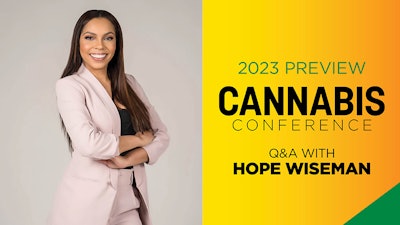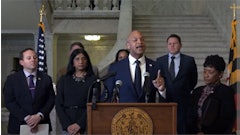
Hope Wiseman founded Mary & Main Dispensary in Maryland’s medical cannabis market in 2014 and has learned plenty of lessons in the nearly 10 years since her storefront opened in Capitol Heights.
Here, ahead of her session at Cannabis Conference 2023, Wiseman shares a preview of her advice for retail start-ups when it comes to site selection, securing funding, community engagement, hiring and more.
Editor's note: Hope Wiseman will speak at Cannabis Conference on the "How to Launch A Cannabis Dispensary Workshop," which will run from 10 a.m. to 5:30 p.m. on Tuesday, Aug. 15. In this in-depth workshop, experienced dispensary operators will share lessons on site selection and market analysis; start-up budgeting and unexpected costs; how to work with municipalities and regulatory committees; critical team members, partners and vendors to hire; keys to product selection and pricing; and much more. Visit www.CannabisConference.com for more information and to register.
Melissa Schiller: What advice do you have for aspiring dispensary owners when it comes to site selection?
Hope Wiseman: Number one is definitely going to be parking. It depends on if you’re in an area with a lot of foot traffic or not, but I think parking is super important. It depends on your business model. Are you going to be a drive-thru? Are you going to be a store that has a walk-up window? I know a few stores have found success that way. Are you going to be a store where people are coming in and that’s going to be your main form of serving people? I think size matters, depending on your business model. So, understand that first. Pick a building that accommodates that type of traffic and then parking—those are two of the most important things. Lastly, the demographics of your area are important. You want to find an area where the demographics support retail businesses.
MS: What are some of your top tips for securing funding for a retail start-up?
HW: I’d say the main thing is to be realistic with your projections. I think at this point, the industry is more mature, and a lot of markets are more mature, so it’s easier to predict what you’ll be able to do. I find that a lot of start-ups are baking their numbers a little bit, and it’s not realistic. Sometimes when you raise on those valuations, it becomes very difficult to pay back your investors and it sours the whole deal. I’d say my biggest advice is to be as lean as possible, try to get through as much of the process on your own without taking investor dollars, and when you do, find a way to be realistic about your projections so that you’re able to actually service the debt and/or equity partner that you have.
MS: How should retail operators approach budgeting, as well as unexpected costs?
HW: To go back to my first statement, be as lean as possible. You don’t want to spend a lot of money on things that are not necessities in the beginning. You know that construction always takes longer and costs more than you estimate, so people should bake that in there. Legal fees end up costing a lot and, at the end of the day, it’s better to focus on that in the beginning than having to clean it up later in the future. It becomes very difficult once you’re operating your business to go back and clean up your paperwork. So, I’d say those are two of the biggest unforeseen costs that people don’t account for when they’re going through opening a dispensary.
MS: How can dispensary owners successfully build relationships with their communities and local regulators?
HW: I would say to fill in the gaps in your local communities. For us, in Capitol Heights, we talked to the actual city of Capitol Heights and our county, Prince George’s County. We talked to a lot of stakeholders, and we quickly realized a gap in our area [is] there are no grocery stores. It has created food insecurity in our area. We partnered with a nonprofit to bring a farmers’ market to our parking lot every other Friday. … We’ve been doing it the past few years during the season.
RELATED: 7 Things I Wish I Had Known About Opening a Dispensary
So, I would say fill in the gaps that your local community has. Work with your municipalities themselves and city council members and county executives—that’s a great way to do it. I would also say get out there and talk to other business owners in your community. Host events at your store so you can meet people in the community, and host events that don’t always have to be [related to] cannabis and/or selling something. That’s something that we’ve become really good at, hosting events where people can just be communal together. That’s where we really learn how we can serve our community, when we’re actually out and talking to people. [The farmers’ markets] have nothing to do with cannabis. We have lots of people come that are not shopping with us or anything like that. We were able to provide that opportunity for a community that needed it.
MS: How should dispensary operators approach hiring for their new business?
HW: In the start-up stage, everyone has to be cross-trained, and people have to be able to wear multiple hats. I know that in the beginning of a business, you might say, “OK, I’m going to have a receptionist and I’m going to have 10 budtenders and I want to have an inventory manager, assistant manager and a store manager.” And then you realize when you get there that the receptionist might also be budtending and might have to go in the back and receive an order when the inventory manager is not there. So, my biggest piece of advice in the beginning, especially, is make sure everyone is cross-trained to be able to play any role because it takes a little while to figure out what the flow of your store is going to be and exactly how many employees you’re going to need. What you may believe is the right workflow, it might not be once you actually begin operating. That’s my biggest piece of advice: Cross-train everyone, take six months or so to let the flow of your store settle in, and then revise your staffing and people’s positions.
MS: What tips do you have for product selection and pricing? How should you set up your menu in the beginning?
HW: In the beginning, it depends on your market. Some markets are much more limited than others, so there’s not a lot of variety in products. Really look at your demographics where your store is located. For instance, where I am, it’s a heavy flower location. Honestly, any dispensary, the number one category is going to be flower. But in my area, we just don’t sell a lot of concentrates. … It doesn’t make sense for us to stock up on them and spend all that money and have them just sitting. So, we keep a small amount of concentrates in our inventory, where there are other stores in other areas where their number two category is concentrates.
So, really understand your demographics. In the beginning, I would have a small variety of a lot of different things so that you can gauge, “OK, this is what my customers like [and] they hated this, so I’m not buying any more of that.” Have a decent variety in the beginning. Buy a little bit of a lot and eventually you’ll home in on the vendors that you enjoy working with and that your patients and/or customers like.
MS: What is one thing you'd like attendees to take back to their business after attending your session this year?
HW: After attending my session, I am hopeful that attendees feel confident in opening up a dispensary. I’m excited to go to the next stage. I feel like I’ve talked a lot about the application process and going through that, and I’m super excited to talk to people that are ready to take the real plunge in opening up their stores and need that advice from someone that has gone through it and made a lot of the mistakes that hopefully they won’t have to. I hope that people feel empowered and that they have all the resources and tools that they need to be able to successfully open a new store.
Join us this year at the Paris Las Vegas Hotel & Casino for Cannabis Conference, the leading education and expo event for plant-touching businesses.






















